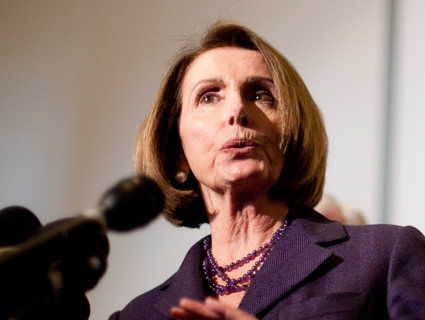
Pete Marovich/Zuma
Is House Minority Leader Nancy Pelosi helping companies in her district get around new health care rules? Conservatives seem to think so, but their evidence is spotty at best.
Last month, the Obama administration granted a reprieve to 204 businesses and policyholders from new health coverage rules under the Affordable Care Act, bringing the total number of waivers to more than 1370. Many of the waivers are for limited benefit or so called “mini-med” plans—controversial rock-bottom plans that provide a very limited amount of coverage (sometimes as little as $2,000 a year) to beneficiaries that are used heavily in low-wage industries like the restaurant business. New federal rules require such plans to offer a minimum of $750,000 of coverage annually, and the waivers exempt the mini-med plans from such rules on a case-by-case basis.
The Daily Caller reported on Tuesday that businesses in Pelosi’s district received nearly 20 percent of the waivers in April, pointing out that many of them went to high-end restaurants and hotels. Sarah Palin piled on in a subsequent interview with the Caller, calling the discovery “unflippingbelievable!” and “corrupt.”
Pelosi’s communications director, Nadeam Elshami, pushed back against the criticisms in an email to Mother Jones, denying that Pelosi’s district received any special treatment. Her office also denied that it was at all involved in the process of granting waivers for these businesses. “It is pathetic that there are those who would be cheering for Americans to lose their minimum health coverage or see their premiums increase for political purposes,” Elshami wrote Tuesday afternoon, emphasizing that health-care waivers “are reviewed and granted solely by the Administration in an open and transparent process.”
In fact, the recent waiver applications from businesses in Pelosi’s district were not even received by the minority leader’s office. Rather, they were submitted directly to the Obama administration through a third-party company, Flex Plan Services, which provides benefit administration to companies in the Bay Area, Washington state, and elsewhere in the country, according to a statement issued by Richard Sorian, an assistant HHS secretary. On March 23, Flex Plan Services submitted applications for annual limit waivers for their clients’ health plan, including 69 businesses in California, 20 in Washington state, two in Georgia, and one in Alaska, including restaurants, home health care providers, and other service-based companies. On April 4, the U.S. Department of Health and Human Services approved the waiver request for all of Flex Plan Services’ clients—not just the ones in Pelosi’s district.
Flex Plan Services never contacted Pelosi’s office about their waiver request, and her office did neither provided any information to the company about the waivers nor helped facilitate the request, according to her spokesperson.
In other words, the reason the waivers were clumped together was because Flex Plan Services—which is in charge of administrating all of these businesses’ health care benefits—had issued a waiver request for the entire group of businesses. Altogether, the Obama administration has granted 1372 waivers and has denied about 100 requests. The mini-med waivers are essentially a stop-gap measure designed to keep employers from dropping health care benefits all together. The White House explains that waivers are granted if conforming to the rules “would disrupt access to existing insurance arrangements or adversely affect premiums, causing people to lose coverage,” acknowledging that the low-benefits plans are sometimes the only option that some employers can offer. The Democrats’ rationale is that the other changes under federal health reform will eventually allow employers to receive better, more affordable coverage under the health insurance exchange, when it begins operating in 2014.
To be sure, it’s worth closely examining which businesses and policyholders have received waivers, as well as which ones have denied them, along with the Obama administration’s rationale for making such decisions. But, as the April waivers reveal, the very fact that reprieves have been granted to businesses residing in democratic districts doesn’t mean the process is unjust. And to assume that the rationale must be political or “corrupt” is to turn a real policy issue into a partisan bludgeon.










